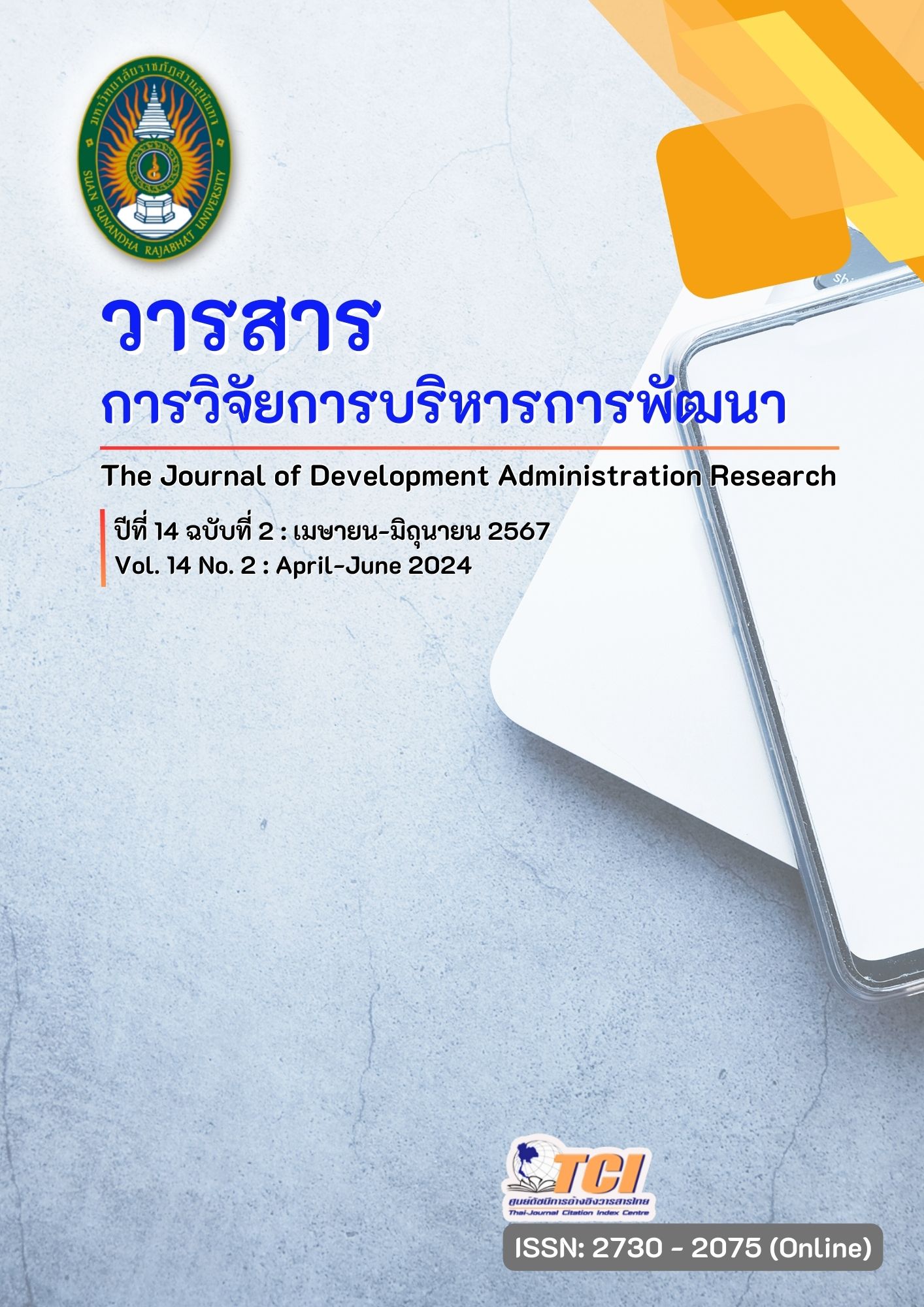Factors affecting students' entry into entrepreneurship in Higher education institutions under the network of the upper central region of the Office of the Commission on Higher Education in Thailand
คำสำคัญ:
Factor affecting, Entry into entrepreneurship, Higher education, Thailandบทคัดย่อ
This research aims to analyze the factors affecting the entry into entrepreneurship of students in higher education institutions under the network of the upper central region of Thailand. The primary data was collected from an online questionnaire sent to 400 samples, obtained by random sampling method selected from students in public and private institutions. The structural equation model was applied for analysis. The results showed that economic factors were risk tolerance, returns in monetary terms, and the cost of starting a new business. The motivation factors were being the boss, having the highest success, and social acceptance. The commitment factors include acquiring the necessary knowledge and skills, perseverance, and belief in success to influence entry into successful entrepreneurship of students in Thai higher education institutions under the upper central region network
เอกสารอ้างอิง
Ahmed, S. U. (1985) Nach, Risk-Taking Propensity, Locus of Control and Entrepreneurship. Personality and Individual Differences, 6(6),781-782.
Ajzen, I. (1991). The theory of planned behavior. Organizational Behavior and Human Decision Processes, 50(2), 179-211.
Ampol, N. and Pattarada, R. (2020). Entrepreneurial Intention of Students in Higher Education Institutions within the Network of the Upper Central Region of Thailand. Humanitiesand Social Sciences Letters, 8(3): 342-353.
Ampol, N., et al. (2020). Study of Green Logistics Managing Potential and the Prepareness of Auto Parts Industries in Thailand. Tem Journal, 9(4), 1524-1534.
Audretsch, D. B., et al. (2002). The economics of science and technology. Journal of Technology Transfer, 27(2), 155-203.
Begley, T. M. and Boyd, D. P. (1987) Psychological Characteristics Associated with Performance in Entrepreneurial Firms and Smaller Businesses. Journal of Business Venturing,2, 79-93.
Cochran, W. G. (1977). Sampling techniques. (3rd ed.). New York: John Wiley & Sons.
Collins, C. J., Hanges, P. J. and Locke, E. A. (2004). The Relationship of Achievement Motivation to Entrepreneurial Behavior: A Meta-Analysis. Human Performance, 17(1), 95-117.
Deci, E. L. (1971). Effects of externally mediated rewards on intrinsic motivation. Journal of Personality and Social Psychology, 18, 105–115.
Fishbein, M., & Ajzen, I. (1975). Belief, Attitude, Intention, and Behavior: An Introduction to Theory and Research. Reading, MA: Addison-Wesley.
Hergenhahn, B. R. (2009). An Introduction to Theories of Learning. New Jersey: Pearson/Prentice Hall.
Kelloway, E.K. (2015). Using Mplus for Structural Equation Modeling; A Researcher’s Guide. CA: Sage Publications.
Krejcie, R.V. & Morgan, D.W. (1970). Determining sample size for research activities. Educational and Psychological Measurements, 30, 607-610.
Krueger, N.F., Reilly, M.D. & Carsrud, A.L. (2000): Competing models of entrepreneurial intentions, Journal of Business Venturing,15 (5/6), 411-432.
Latham, J. R. (2012). Management system design for sustainable excellence: Framework, Practices, and considerations. Quality Management Journal, 19(2), 15.
Liñán, F. (2004): Intention-based models of entrepreneurship education. Piccolla Impresa/ Small Business, 3, 11-35.
Locke, E. A., & Latham, G. P. (1990). A theory of goal setting & task performance. Prentice- Hall, Inc.
Locke, Edwin A. (2003). On May Day Delebrate Capitalism. Archived from the Original, August 27,2013.
Maslow, A. H. (1970). Motivation and personality. 2nd Ed. New York: Harper & Row.
Ndovela, S.M. (2017). An investigation into entrepreneurial intent amongst final year Commerce Students at the Durban University of Technology [Master of Technology in Business Administration]. University of Technology Durban, South Africa.
Newman, W. L. (1997). Social Research Methods. Boston: Allyn and Bacon.
Pangestu, G., Nicky, Fuston, P., & Kumar, M. S. (2014). Factors that Affect the Entrepreneurs Growth in Bekasi. International Journal of Scientific and Research Publications, 4(1),1–8.
Pinder, C.C. (1998). Work motivation in organizational behavior. Upper Saddle River, NJ: Prentice Hall.
Rockart, J.F. (1979) Chief Executives Define Their Own Data Needs. Harvard Business Review, 57, 81-93.
Ryan, R. M. & Deci, E. L. (2017). Self-determination theory: Basic psychological needs in motivation, development, and wellness. New York: Guilford Publishing.
Scott, S.; Venkatraman, S. (2000). The promise of entrepreneurship as a field of research. Academy of Management Review, 25, 217–226.
Serino, L., & Buccino, G. (2019). Entrepreneurial Intentions among Italian Students: The Role of Gender. International Journal of Academic Research Business and Social Sciences, 9(3), 1309–1326.
Stewart, W. H., Jr., Roth, P. L. (2007). A Meta-Analysis of Achievement Motivation Differences between Entrepreneurs and Managers, Journal of Small Business Management, 45(4), 401-421.
Vanitbuncha, K. (2013). Structural Equation Analysis (SEM) by AMOS. Bangkok: Chulalongkorn Printing.
ดาวน์โหลด
เผยแพร่แล้ว
รูปแบบการอ้างอิง
ฉบับ
ประเภทบทความ
สัญญาอนุญาต
ลิขสิทธิ์ (c) 2024 วารสารการวิจัยการบริหารการพัฒนา

อนุญาตภายใต้เงื่อนไข Creative Commons Attribution-NonCommercial-NoDerivatives 4.0 International License.
บทความที่ได้รับการตีพิมพ์เป็นลิขสิทธิ์ของมหาวิทยาลัยราชภัฏสวนสุนันทา
ข้อความที่ปรากฏในบทความแต่ละเรื่องในวารสารวิชาการเล่มนี้เป็นความคิดเห็นส่วนตัวของผู้เขียนแต่ละท่านไม่เกี่ยวข้องกับมหาวิทยาลัยราชภัฏสวนสุนันทา และคณาจารย์ท่านอื่นๆ ในมหาวิทยาลัยฯ แต่อย่างใด ความรับผิดชอบองค์ประกอบทั้งหมดของบทความแต่ละเรื่องเป็นของผู้เขียนแต่ละท่าน หากมีความผิดพลาดใดๆ ผู้เขียนแต่ละท่านจะรับผิดชอบบทความของตนเองแต่ผู้เดียว




